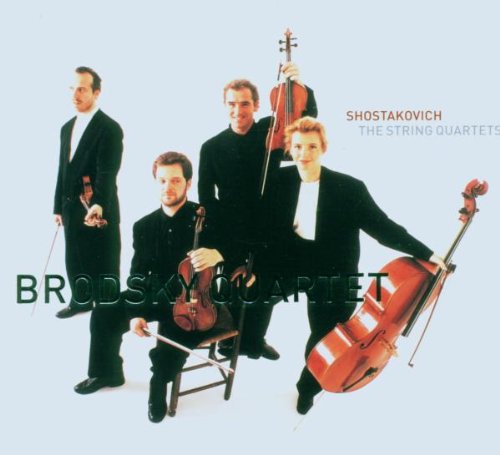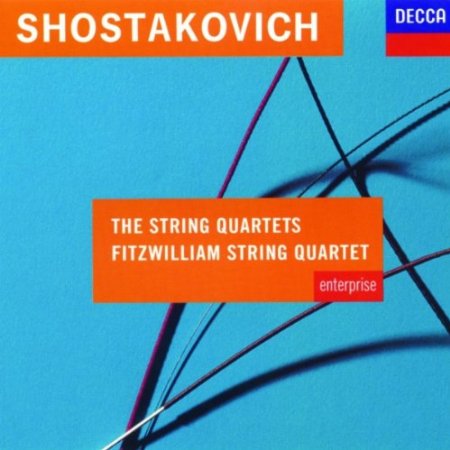Shostakovich String Quartets
View record and artist detailsRecord and Artist Details
Composer or Director: Dmitri Shostakovich
Label: Teldec (Warner Classics)
Magazine Review Date: 6/1992
Media Format: CD or Download
Media Runtime: 375
Mastering:
DDD
Catalogue Number: 9031-71702-2

Tracks:
| Composition | Artist Credit |
|---|---|
| String Quartet No. 1 |
Dmitri Shostakovich, Composer
Brodsky Quartet Dmitri Shostakovich, Composer |
| String Quartet No. 2 |
Dmitri Shostakovich, Composer
Brodsky Quartet Dmitri Shostakovich, Composer |
| String Quartet No. 3 |
Dmitri Shostakovich, Composer
Brodsky Quartet Dmitri Shostakovich, Composer |
| String Quartet No. 4 |
Dmitri Shostakovich, Composer
Brodsky Quartet Dmitri Shostakovich, Composer |
| String Quartet No. 5 |
Dmitri Shostakovich, Composer
Brodsky Quartet Dmitri Shostakovich, Composer |
| String Quartet No. 6 |
Dmitri Shostakovich, Composer
Brodsky Quartet Dmitri Shostakovich, Composer |
| String Quartet No. 7 |
Dmitri Shostakovich, Composer
Brodsky Quartet Dmitri Shostakovich, Composer |
| String Quartet No. 8 |
Dmitri Shostakovich, Composer
Brodsky Quartet Dmitri Shostakovich, Composer |
| String Quartet No. 9 |
Dmitri Shostakovich, Composer
Brodsky Quartet Dmitri Shostakovich, Composer |
| String Quartet No. 10 |
Dmitri Shostakovich, Composer
Brodsky Quartet Dmitri Shostakovich, Composer |
| String Quartet No. 11 |
Dmitri Shostakovich, Composer
Brodsky Quartet Dmitri Shostakovich, Composer |
| String Quartet No. 12 |
Dmitri Shostakovich, Composer
Brodsky Quartet Dmitri Shostakovich, Composer |
| String Quartet No. 13 |
Dmitri Shostakovich, Composer
Brodsky Quartet Dmitri Shostakovich, Composer |
| String Quartet No. 14 |
Dmitri Shostakovich, Composer
Brodsky Quartet Dmitri Shostakovich, Composer |
| String Quartet No. 15 |
Dmitri Shostakovich, Composer
Brodsky Quartet Dmitri Shostakovich, Composer |
Composer or Director: Dmitri Shostakovich
Genre:
Chamber
Label: Enterprise
Magazine Review Date: 6/1992
Media Format: CD or Download
Media Runtime: 376
Mastering:
Stereo
ADD
Catalogue Number: 433 078-2DM6

Tracks:
| Composition | Artist Credit |
|---|---|
| String Quartet No. 1 |
Dmitri Shostakovich, Composer
Dmitri Shostakovich, Composer Fitzwilliam Qt |
| String Quartet No. 2 |
Dmitri Shostakovich, Composer
Dmitri Shostakovich, Composer Fitzwilliam Qt |
| String Quartet No. 3 |
Dmitri Shostakovich, Composer
Dmitri Shostakovich, Composer Fitzwilliam Qt |
| String Quartet No. 4 |
Dmitri Shostakovich, Composer
Dmitri Shostakovich, Composer Fitzwilliam Qt |
| String Quartet No. 5 |
Dmitri Shostakovich, Composer
Dmitri Shostakovich, Composer Fitzwilliam Qt |
| String Quartet No. 6 |
Dmitri Shostakovich, Composer
Dmitri Shostakovich, Composer Fitzwilliam Qt |
| String Quartet No. 7 |
Dmitri Shostakovich, Composer
Dmitri Shostakovich, Composer Fitzwilliam Qt |
| String Quartet No. 8 |
Dmitri Shostakovich, Composer
Dmitri Shostakovich, Composer Fitzwilliam Qt |
| String Quartet No. 9 |
Dmitri Shostakovich, Composer
Dmitri Shostakovich, Composer Fitzwilliam Qt |
| String Quartet No. 10 |
Dmitri Shostakovich, Composer
Dmitri Shostakovich, Composer Fitzwilliam Qt |
| String Quartet No. 11 |
Dmitri Shostakovich, Composer
Dmitri Shostakovich, Composer Fitzwilliam Qt |
| String Quartet No. 12 |
Dmitri Shostakovich, Composer
Dmitri Shostakovich, Composer Fitzwilliam Qt |
| String Quartet No. 13 |
Dmitri Shostakovich, Composer
Dmitri Shostakovich, Composer Fitzwilliam Qt |
| String Quartet No. 14 |
Dmitri Shostakovich, Composer
Dmitri Shostakovich, Composer Fitzwilliam Qt |
| String Quartet No. 15 |
Dmitri Shostakovich, Composer
Dmitri Shostakovich, Composer Fitzwilliam Qt |
Author:
If Shostakovich's cycle of 15 symphonies can be said to represent a musical thread passing through the whole of the composer's public life, then it can be argued that his cycle of 15 string quartets represents the private persona of the man behind the mask from the beginning of his personal anguish in the late 1930s until his death in 1975. At the time of his First Quartet, composed in 1938, he was already an experienced and respected composer with five symphonies to his credit as well as much music for stage and film. But his sudden withdrawing of his Fourth Symphony and his artist's response in his Fifth Symphony had made the young revolutionary acutely aware of the precarious role of the creative artist in Stalin's Soviet Union. Thenceforth his symphonic music inscrutably presented the emotions—albeit largely ironically—that the State expected from its leading composer while the quartets provided an outlet for the emotions within and for his personal responses to the events taking place in the world around him.
If the music is rich in irony, then the language that Shostakovich uses is remarkably straightforward with a defined tonality, simple melodies, uncluttered rhythms and clear textures. Yet, there is only one possible composer, so recognizably individual is the voice. At the same time, the music is full of allusions—the motif D-E flat-C-B based on his initials DSCH is now common knowledge, as are the autobiographical self-quotations in the Eighth Quartet. But there are other recurring fingerprints—melodic motifs, rhythmic patterns, harmonic progressions—the secrets of which are perhaps known only to a handful of Shostakovich's oldest and closest friends. If they were ever to be revealed, then we would have a much more complete picture of Shostakovich the man.
With such a range of wonderful music, it is good to have two complete cycles of the string quartets on disc and both recorded by British Quartets. The Fitzwilliam Quartet recorded their cycle originally in the mid-1970s, shortly after a concentrated period of study with the composer. Nos. 4 and 12 won a Gramophone Award in 1977. Despite being recorded in analogue, the sound-quality is still remarkably good. The Brodsky Quartet, a promising and highly-regarded young group, recorded their cycle in 1989, not long after playing all the quartets on London's South Bank. Their performances are admirably clean and accurate, in some respects more technically poised than those of the Fitzwilliam Quartet. Yet, it is the performances of the Fitzwilliam Quartet to which I find myself being drawn back. They have a remarkable understanding of the idiom and of the music's underlying motivation. Take the First Quartet: while the Brodskys play all the notes in the right place and have a scrupulous regard for the tempos and the dynamics, it is the Fitzwilliam Quartet that captures the uneasy mood (reminiscent of the contemporary Fifth Symphony) behind the seemingly placid surface. In the Fourth Quartet, the Fitzwilliams give the Jewish idioms—a metaphor for the oppressed artist and never far away in Shostakovich's music—a more deliberate, and thus more natural-sounding, tempo. Probably the best known of the quartets in Britain is No. 8, composed in Dresden in 1960 and dedicated to the victims of Fascism and of the War, and in view of the constant use of the DSCH motif and the quotations from several of his own pieces, there can be little doubt that Shostakovich considered himself among their number. It's a grim, often macabre, work and, once again, it's the Fitzwilliams that capture the loneliness of the composer. So often, his solo melodies, set against a stark and sombre accompaniment, sound like a voice crying in the wilderness. (The Fitzwilliams' recording of Nos. 3, 8 and 13 is, incidentally, also available on a single disc (CD) 421 475-2DH, 4/89.)
The music of Shostakovich is perhaps the most personal of any written in the twentieth century. For that reason, and because the quartets encompass the complete gamut of human emotion, one close friend of Shostakovich has described him as ''the Beethoven of our age''. The quartets are well worth getting to know and the performances by the Fitzwilliam Quartet, despite being 15 years old, still seem to reach the heart of the composer's intentions.
Discover the world's largest classical music catalogue with Presto Music.

Gramophone Digital Club
- Digital Edition
- Digital Archive
- Reviews Database
- Full website access
From £8.75 / month
Subscribe
Gramophone Full Club
- Print Edition
- Digital Edition
- Digital Archive
- Reviews Database
- Full website access
From £11.00 / month
Subscribe
If you are a library, university or other organisation that would be interested in an institutional subscription to Gramophone please click here for further information.




